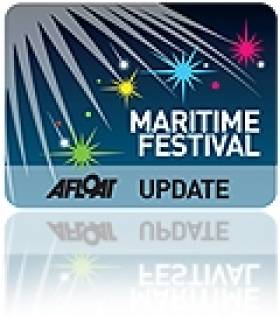Displaying items by tag: Foyle Search and Rescue
New recruits in the Irish Coast Guard as well as search and rescue teams on loughs Neagh and Foyle are featured in a new four-part Irish-language TV series following the next generation of emergency workers.
999 Faoi Oiliúint debuted on RTÉ One last week with new team volunteer Martin O’Neill out on patrol with Foyle Search and Rescue, while the latest episode from this past Monday (24 April) follows Ruaidhri Ó Domhnaill during his first year of training with Killybegs Coast Guard in Co Donegal.
Filmed over the course of a year, the documetary series accompanies the cadets as they navigate an intense training regimen and deal with real-life emergencies callouts.
The next episode of 999 Faoi Oiliúint is on RTÉ One next Monday 1 May at 8pm and previous episodes are available on RTÉ Player for viewers in the Republic of Ireland.
Last month Foyle Search and Rescue announced the refresh and upgrade of its drone programme following a £39,000 donation from supporters in the local video games industry. It operates on the River Foyle, which flows through the City of Derry in the North West of Northern Ireland.
Foyle Search and Rescue is a registered, voluntary based search and rescue charity that local people set up in 1993 in response to the alarmingly high number of lives being lost in the area that year. It has adopted the role of preventing suicide and supporting families in the City.
The team's fleet includes six new ultra-lightweight deployable drones and a new flagship heavyweight drone with thermal imaging. The heavyweight Matrice 300 drone named Delta November 1 can be deployed in low-visibility operations and adverse weather conditions. The drone is named in honour of the Foyle Search and Rescue drone team's co-founder, Danny Nelis, who passed away in 2019.
 Foyle Search and Rescue on the river
Foyle Search and Rescue on the river
The total donation comprises equal contributions from local video game developer Hypixel Studios, parent company Riot Games Social Impact fund, the owners of the Hypixel Minecraft server, Hypixel Studios CEO Aaron Donaghey, and an anonymous donor.
 The drone is named in honour of the Foyle Search and Rescue drone team's co-founder, Danny Nelis, who passed away in 2019
The drone is named in honour of the Foyle Search and Rescue drone team's co-founder, Danny Nelis, who passed away in 2019
Sean McCafferty, Chief Operating Officer of Hypixel Studios, said: "As locals, we're hugely supportive of the important work that Foyle Search and Rescue do and happy for this opportunity to help them expand their capabilities." Jeffrey Burrell, Director of Social Impact at Riot Games, said: "Riot Games is proud to support this important program for Foyle Search and Rescue and know that it will make a meaningful and long-lasting impact for the community.
Pat Carlin, newly appointed Chairman of Foyle Search and Rescue is very appreciative of this donation. "This new fleet of drones will allow us to expand our search and rescue capabilities as the drone team are now able to deploy at night and in heavy rain or wind thanks to weatherproofing and high-end thermal cameras".
And Paul Smith, Foyle Search and Rescue Drone Team Coordinator, said: "As the other co-founder of the drone team and speaking with the blessing of Danny's family, we feel that naming the drone after his call sign is a fitting tribute. Together we set up the project five years ago and the drone program continues as part of his legacy going from strength to strength. Danny will always be remembered at the charity."
Foyle Search and Rescue continues to operate during the COVID-19 pandemic and remains on call 24/7.
Life Patrol: On The Banks of The Foyle
#Maritime TV Programmes – A new series Life Patrol: On The Banks Of The Foyle starts tomorrow night at 10.35pm on BBC 1 Northern Ireland.
The series gets exclusive access following the work of the Foyle Search and Rescue, the Derry/Londonderry based charity run by volunteers as they patrol the banks of the Foyle, one of the fastest flowing rivers in Europe.
Life Patrol was filmed during the Christmas/New Year period of 2011/12 and the one-hour documentary brings viewers out on patrol with the volunteers who are trained in suicide intervention. They need to call upon all their training as they are faced with highly charged emotional situations.
Des Henderson, who produced, filmed and directed the programme said: "Foyle Search and Rescue is a remarkable organisation. Sometimes you can forget these are unpaid volunteers. To see first hand what they do and the positive part they play in the local community makes you realise the important role they play in keeping people safe and saving lives on the Foyle".
He added: "I hope the programme will give viewers a real insight into the invaluable work they do and highlights their contribution when coming face-to-face with a social problem felt by many communities."
Boats Head for 'Foyle Days' 2011
Over the years she has changed hands between Dutch and UK interests for recreational use. Several years ago she starred in the RTE TV reality show 'Cabin Fever' where she replaced the show's first ship Camaret of Cornwall (branded as 'Cabin Fever') after it ran aground off Tory Island.
During the two-day festival (11am-5pm) the boating community at the event will include the Coleraine Yacht Club, Foyle Paddlers, Foyle Punts, Lough Foyle Yacht Club, Lough Swilly Yacht Club, Moville Boat Club, RNLI and the Foyle (SAR) Search and Rescue.
Visitors to Foyle Days can call to the Clipper stand and learn more about the city's entry of the Derry~Londonderry boat in the 2011-2012 Clipper Round the World Race. Learn more about the countries the crew will visit and also how to get involved in the event. For more information about the race, at 40,000 miles is the world's longest race go to www.clipperroundtheworld.com/
Running alongside the festival a continental market with 40 stalls will be open to all at the recently revamped Guildhall Square. For further details about Foyle Days click here.
- Clipper Race
- Maritime Festival
- RNLI
- Lough Foyle Yacht Club
- Lough Swilly Yacht Club
- Moville Boat Club
- Derry
- Londonderry
- Tory Island
- JOHANNA LUCRETIA
- Foyle Days
- RTE TV
- Cabin Fever
- Camaret of Cornwall
- Grounding
- Reality TV show
- Clipper Around the World Race
- Guildhall Square
- Continental Market
- Coleraine Yacht Club
- Foyle Search and Rescue
- Foyle Paddlers
- Foyle Punts
- Offshore Sailing
- Clipper Round The World Race
- JOHANNA LUCRETIA

























































